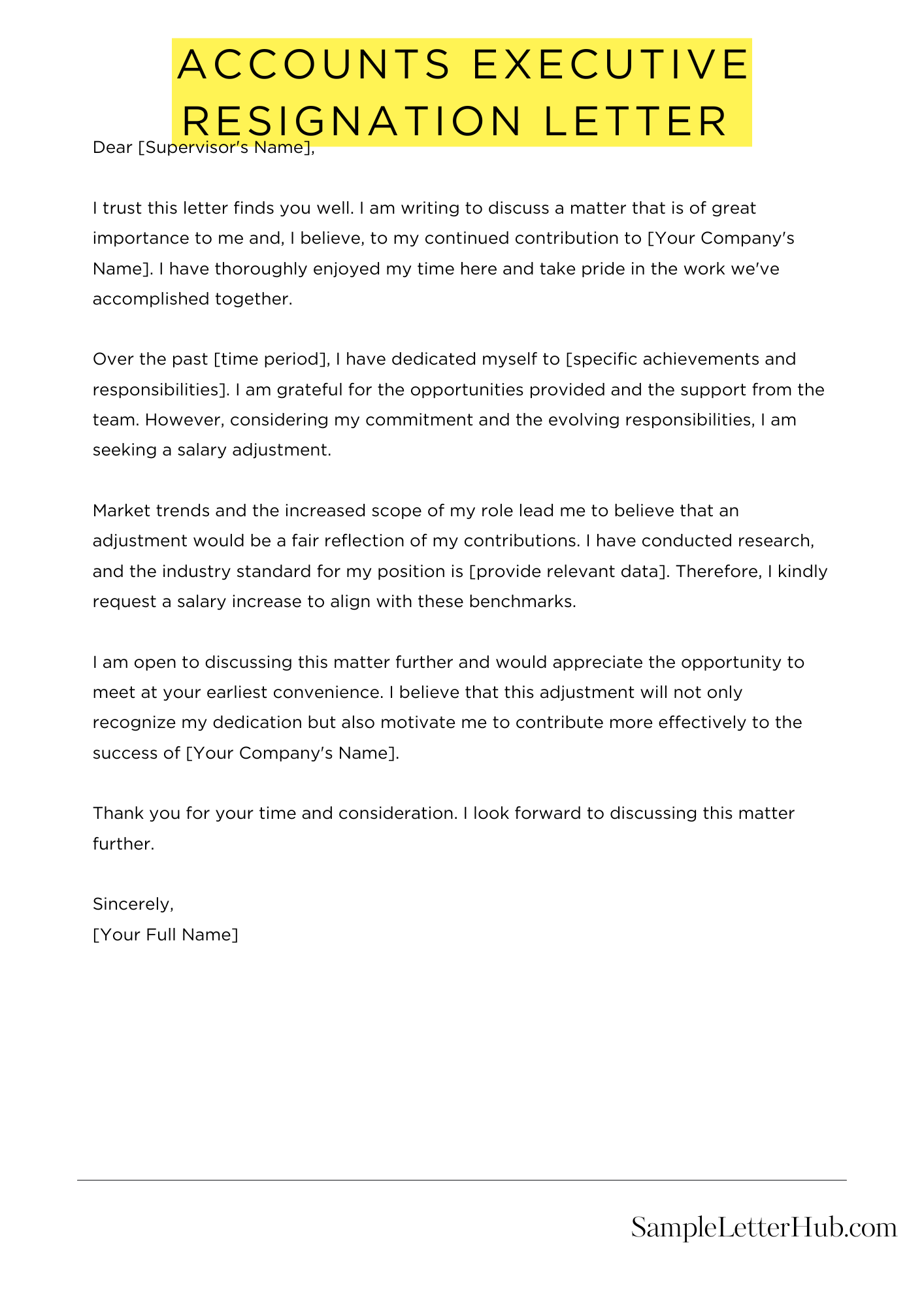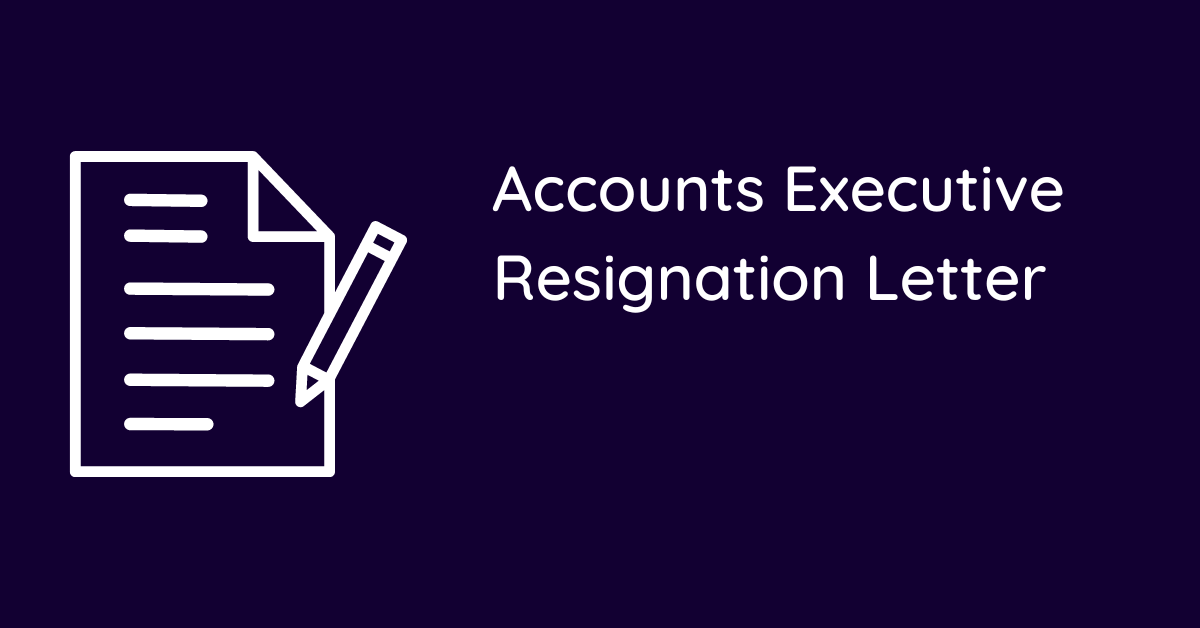When it comes to leaving a job, one of the most important things to do is write a clear and professional resignation letter. This letter should explain your decision to leave, and it should be polite and humble in tone. In this blog post, we’ll share an example of an accounts executive resignation letter that you can use as a template.
When writing your resignation letter, it’s important to be as specific as possible about your reasons for leaving. This will help your employer understand your decision and make it easier for them to find a replacement. You should also be sure to thank your employer for the opportunity to work at the company.
Below, we’ve included a template for an accounts executive resignation letter that you can use as a starting point. Feel free to adapt it to fit your own circumstances.
Accounts Executive Resignation Letter
Dear [Manager’s Name],
Please accept this letter as formal notification that I will be resigning from my position as Accounts Executive at [Company Name], effective two weeks from today, [Last Date of Employment].
During my tenure at [Company Name], I have gained valuable experience and developed strong relationships with clients and colleagues. I am grateful for the opportunities and support I have received during my time here.
I wish you and [Company Name] all the best in the future.
Sincerely,
[Your Signature]
Short Accounts Executive Resignation Letter Sample
Please accept this letter as formal notification that I am resigning from my position as Accounts Executive at [Company Name]. My last day of employment will be [Your Last Day]. Thank you for the opportunity to grow and learn during my time here. I wish you and the company continued success. I am happy to assist in the transition process to ensure a smooth handover of my responsibilities.
I wish you all the best with your accounts executive resignation letter.
When it’s time to say farewell, expressing your gratitude and best wishes can make the transition smoother:

How to Write an Accounts Executive Resignation Letter
1. Start with a Formal Introduction
Begin your letter with a formal salutation, such as “Dear [Manager’s Name].” State your intention to resign from your position as an Accounts Executive, clearly mentioning the date you plan to leave.
2. Express Gratitude and Appreciation
Take this opportunity to express your gratitude for the opportunities and experiences you’ve gained during your time with the company. Highlight specific projects or accomplishments that you’re particularly proud of.
3. State Your Reasons for Leaving
While it’s not necessary to go into excessive detail, you can briefly state your reasons for leaving. This could include pursuing a new opportunity, seeking a different challenge, or relocating.
4. Offer Assistance with the Transition
Let your manager know that you’re willing to assist with the transition during your notice period. Offer to train your replacement or help with any outstanding tasks.
5. End with a Professional Closing
Conclude your letter with a professional closing, such as “Sincerely,” followed by your typed name. You can also include a handwritten signature if you’re sending a physical copy.
Accounts Executive Resignation Letter: 6 FAQs
Resigning from a job can be a daunting task, especially when it comes to writing a resignation letter. If you’re an Accounts Executive, you may have specific questions about how to craft a professional and effective resignation letter. Here are the six most frequently asked questions and answers to help you navigate this process:
1. What should I include in my resignation letter?
Your resignation letter should include the following key elements:
- A clear statement of your intent to resign
- Your last date of employment
- A brief expression of gratitude for the opportunity to work at the company
- Any outstanding tasks or projects you’re working on
- A professional and courteous tone
2. How should I format my resignation letter?
Your resignation letter should be formatted in a professional business letter format. This includes using a standard font, single spacing, and left-aligned text. It should also be concise and to the point, typically no more than a few paragraphs.
3. What should I say in my resignation letter?
While the specific content of your resignation letter will vary depending on your circumstances, it’s generally advisable to keep it brief and professional. Express your gratitude for the opportunity to work at the company, and mention any specific experiences or accomplishments you’re proud of. You can also briefly mention your reasons for leaving, but keep it positive and avoid any negative comments.
4. When should I submit my resignation letter?
It’s generally considered good practice to give your employer at least two weeks’ notice before your last date of employment. This gives them time to find a replacement and ensure a smooth transition. However, if you have a particularly close relationship with your employer or if there are any extenuating circumstances, you may be able to negotiate a shorter notice period.
5. What if I’m feeling nervous about resigning?
It’s perfectly normal to feel nervous about resigning from a job. However, it’s important to remember that you have the right to pursue new opportunities and that your employer will likely understand your decision. If you’re feeling particularly anxious, you can practice what you’re going to say to your employer or ask a trusted friend or family member for support.
6. What should I do after I submit my resignation letter?
Once you’ve submitted your resignation letter, it’s important to maintain a positive and professional attitude until your last day of employment. Continue to perform your job duties to the best of your ability, and offer to help with the transition in any way you can. This will leave a lasting positive impression on your employer and make it more likely that they’ll provide a positive reference in the future.
Before making the decision to resign from your job, it’s essential to consider the legal aspects:
Understanding your emotions after quitting your job is important. Explore why you might be feeling sad:
Related
- Resignation letter sample
- Forced resignation letter
- Resignation letter due to going abroad
- Resignation letter due to marriage
- Resignation letter due to other opportunity
- Resignation letter due to mistake

